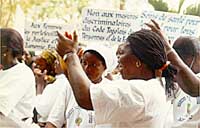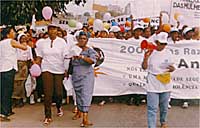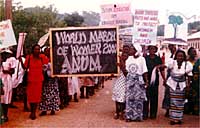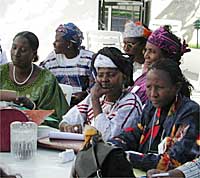April 2002 - Snapshots of Home and Elsewhere - Africa
 |
|
Specific demandsWomen came up with very concrete demands: access to water, the right to inherit (especially land), electrification of the villages, literacy campaigns for women, local health clinics to assure safe childbirth, distribution of information on sexually transmitted diseases, especially AIDS, political representation of women, food security, etc.
In West Africa, women demanded stricter enforcement of the law (where there is one) against genital mutilation, and minimally, that information on this question be made available. They also called for the abolition of levirate (the requirement that a widow marry her brother-in-law). In East Africa, Tanzanian women fought for reform of the regulations governing inheritance that currently exclude women from inheritance. Numerous women whose husbands or fathers have died from AIDS are plunged into poverty. National marchesWomen brought their demands directly to the various authorities (head of state, prime minister, ministers, members of parliament) during national marches and rallies throughout the countrysides.
Demonstrations were held in Benin, Burkina Faso, Burundi, Chad, Guinea, Rodriguez Island, Mali, Mozambique, Rwanda, Senegal, Togo, Zambia. In Rwanda, women had a rally but did not march because this type of action has no significance for them: they walk miles every day! In Kivu (Congo Kinshasa), women designated March 8, 2000, "Women's Day Without the Women." They stayed at home to mourn their loved ones, killed during the war. In São Tomé and Principe, women held a large march on September 19, 2000, to raise awareness about the Convention on Elimination of All Forms of Discrimination Against Women. In Lesotho, the March was held in Maseru. The March revealed to women their capacity for taking united action and mobilizing together. "Our society gives little place to women because they are generally considered as not deserving serious consideration. Still, the seriousness of our demands and the presence of women from throughout the country in all the marches made a strong impression, and men joined us when we marched to the National Assembly," wrote a Nigerian March organizer. Groups participating in the March in Mauritania and Zambia decided to support women candidates in the 2001 national and municipal election campaigns. |
||||||||||||||||||||||
|
|
Copyrights
:
CC by-nc-sa 2.0
Last modified 2006-03-23 03:09 PM This item is available in Français, English, Español |







